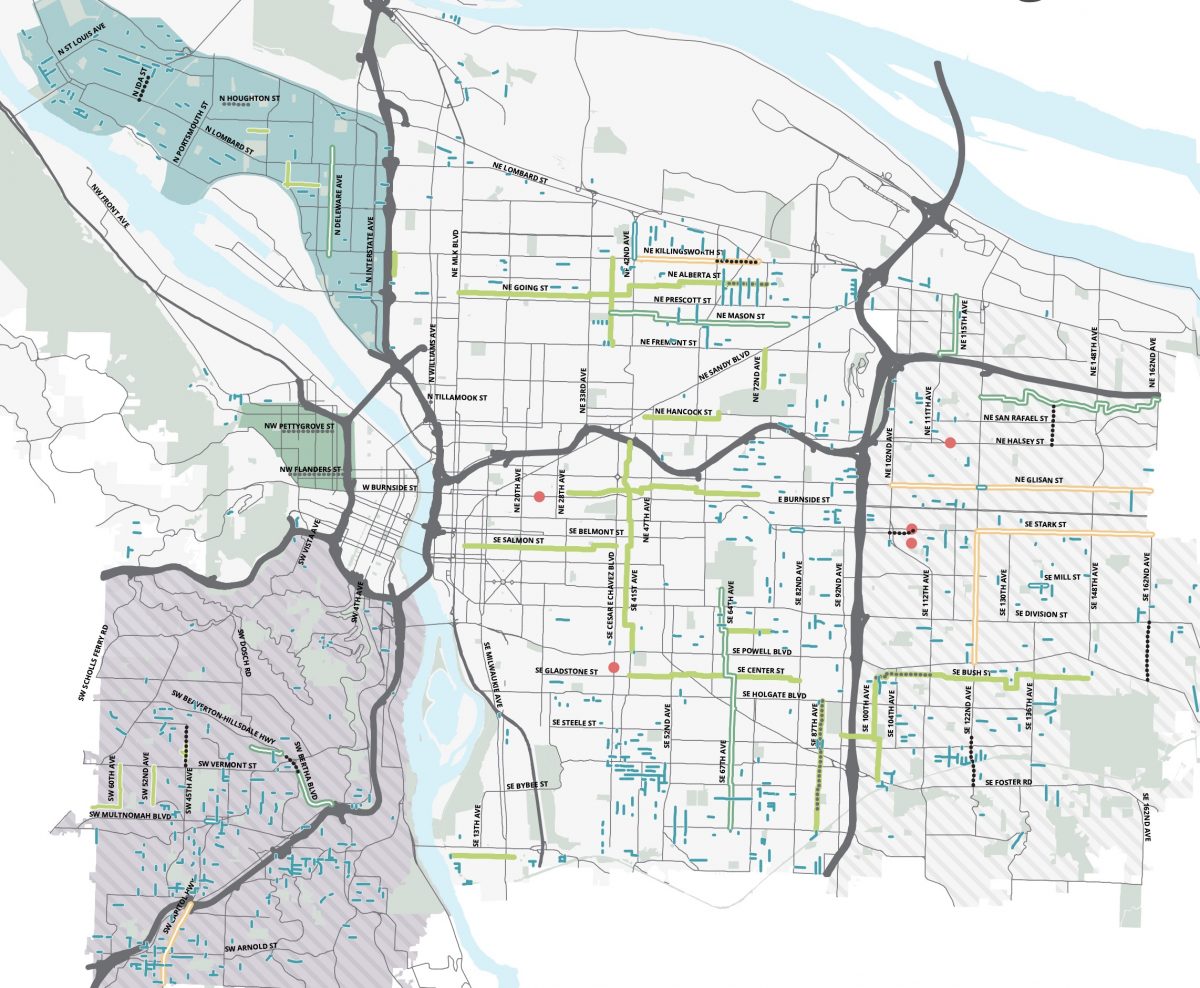
Portland’s local gas tax will be up for re-election in May.
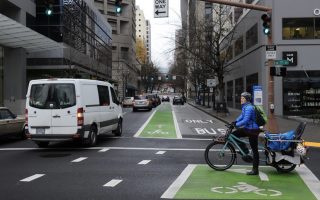
(Photo © J. Maus/BikePortland)
The City of Portland has finalized the list of projects they plan to fund if voters say yes to another four years of a 10-cent tax on fuel. Known as the Fixing Our Streets program, the Portland Bureau of Transportation says they estimate a $76 million haul from the tax’s first four years (and another $8 million from a related Heavy Vehicle Use Tax, which they also plan to renew). The new project list adds up to $74.5 million in expenditures and will go in front of Portland City Council on February 6th, where its expected to get official referral to the May 2020 ballot.
PBOT said in a statement yesterday they’ve already nailed down support for the referral from a wide array of community groups citywide.
The tricky dance for PBOT was to identify the right mix of projects that will not only improve our transportation system, but also garner enough votes to pass. The 2016 tax passed by only four points with just 52% in favor. The result was buoyed by very strong support from central city and close-in neighborhoods. It was a different story east of Interstate 205, where it lost in every precinct. The further east it went, the more “no” votes it saw.
Investing in east Portland is what won the support of Business for a Better Portland Executive Director Ashley Henry, who said in a PBOT statement she approves the list because it will, “Extend the benefits of these investments to more parts of the city.” And Ashton Simpson with The Rosewood Initiative said he believes the program is, “Helping to address the long unfulfilled promises made to East Portland for safer streets.”
The projects are split into three categories: “Smoother streets” ($25 million), “safer streets” ($26 million), and “community transportation services” ($23.5 million).
Advertisement
Here’s the more detailed breakdown via PBOT:
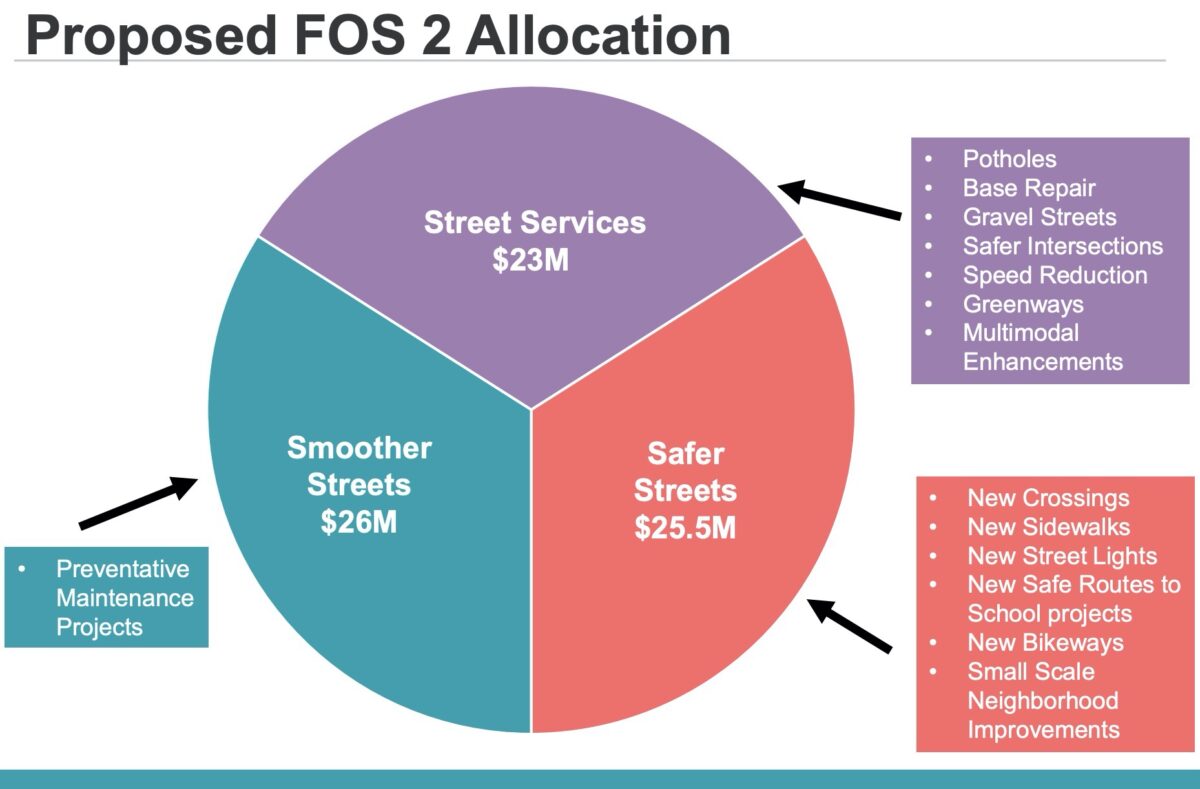
Smoother Streets
$25M for paving with a focus on preventative maintenance for busy and neighborhood streetsSafer Streets:
$5M for new signals and beacons on some of Portland’s most dangerous streets
$4.5M for sidewalks and other walkways
$6M for Safe Routes to School projects
$4.5M for Lighting to improve visibility for everyone, no matter how they travel
$4.5M for Neighborhood Greenways
$1.5M for Neighborhood Safety Improvements to implement small-scale safety projects focused on pedestrians and people bikingCommunity Transportation Services:
Basic Maintenance
$4M for base repair (repairing sections of failing streets) citywide
$4M for maintaining Portland’s gravel streets
$5M for a dedicated, year-round pothole crewBasic Safety Improvements:
$2M for speed reduction on cut-through routes
$4M for additional safety enhancements
$2.5M for Neighborhood Greenway retrofits
$2M for safer intersections
Advertisement
PBOT has focused investments on “high crash network” streets, which make up just 8% of our road network but have accounted for 65% of Portland’s fatal crashes in the last two years. Spending on these large arterials has increased by 300% since 2017 — from $15 million to $60 million — but our death toll continues to climb.
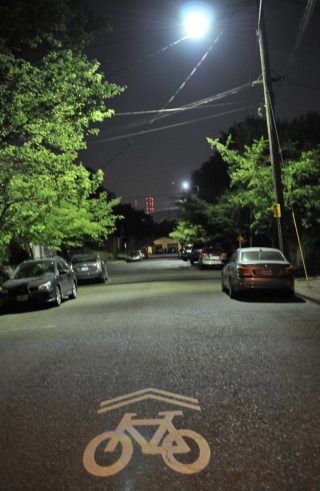
(Photo © J. Maus/BikePortland)
A new priority for 2020 is street lighting. PBOT Project Manager Mark Lear said during a presentation to the city’s Bicycle Advisory Committee in November that lighting wasn’t identified in the 2016 measure and its presence this time around comes as a result of the city’s work to combat racial and geographic inequities. “We’d like to solve this [lighting] problem ASAP,” Lear said.
Lear also said the “massive number of pedestrians still being killed on our streets” was a “big motivator” in deciding where to invest.
If this tax passes in May, it could be one of several new sources of transportation funding revenue for the City of Portland. Also on the ballot is a multi-billion measure from Metro that would direct millions to PBOT. And the Oregon Legislature is set to debate a new version of their cap-and-trade bill that would funnel 80% of transportation-specific carbon auction proceeds to local jurisdictions for implementation of climate plans and projects that reduce greenhouse gas emissions.
For bicycle riders, there’s a lot in this package worth voting for. However, none of them are especially bold or exciting. PBOT’s Lear told the BAC that was done on purpose. When asked by a committee member if the program would pay for traffic diverters on neighborhood greenways (instead of less-effective speed bumps), Lear said, “We’re not going for controversial projects with this measure. We have to be careful about how much we push diversion conversations in an election… We need to be really strategic… Again, we’re talking about a measure that passed by a few percentage points [in 2016]… We have to be strategic of where the public is on the topic [of bike-specific investments].”
Click the map and the gallery below for the entire project list.
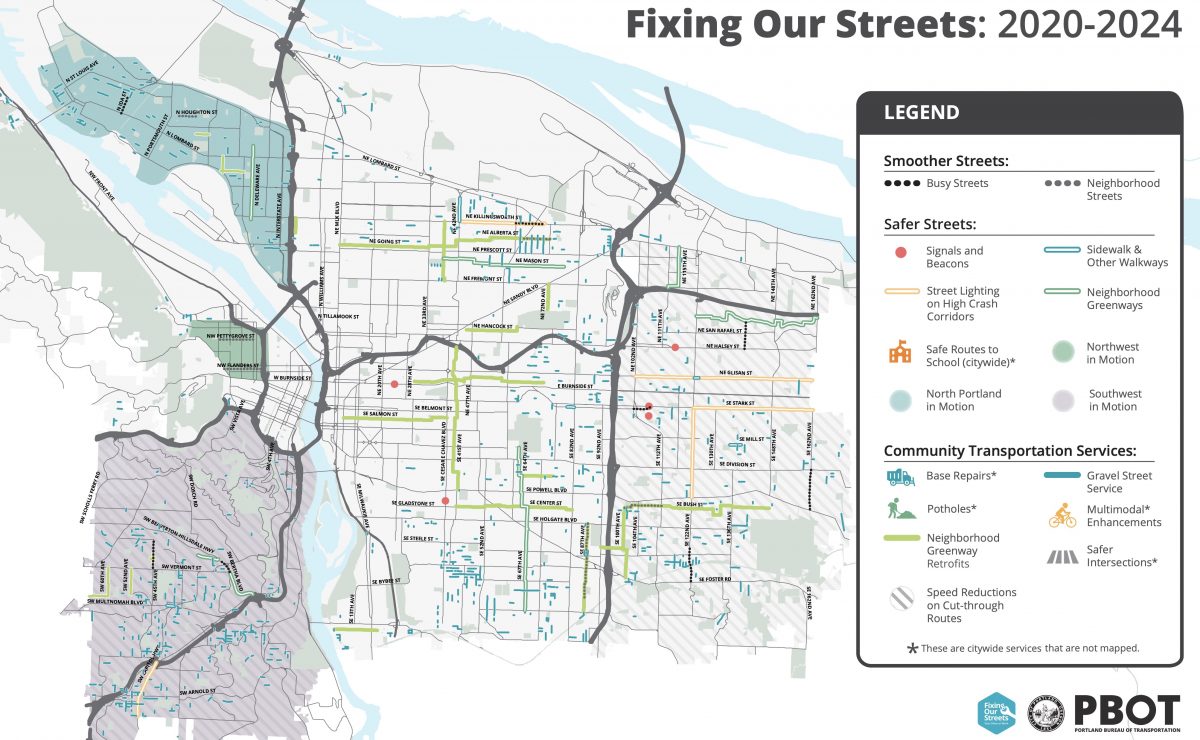
— Jonathan Maus: (503) 706-8804, @jonathan_maus on Twitter and jonathan@bikeportland.org
— Get our headlines delivered to your inbox.
— Support this independent community media outlet with a one-time contribution or monthly subscription.



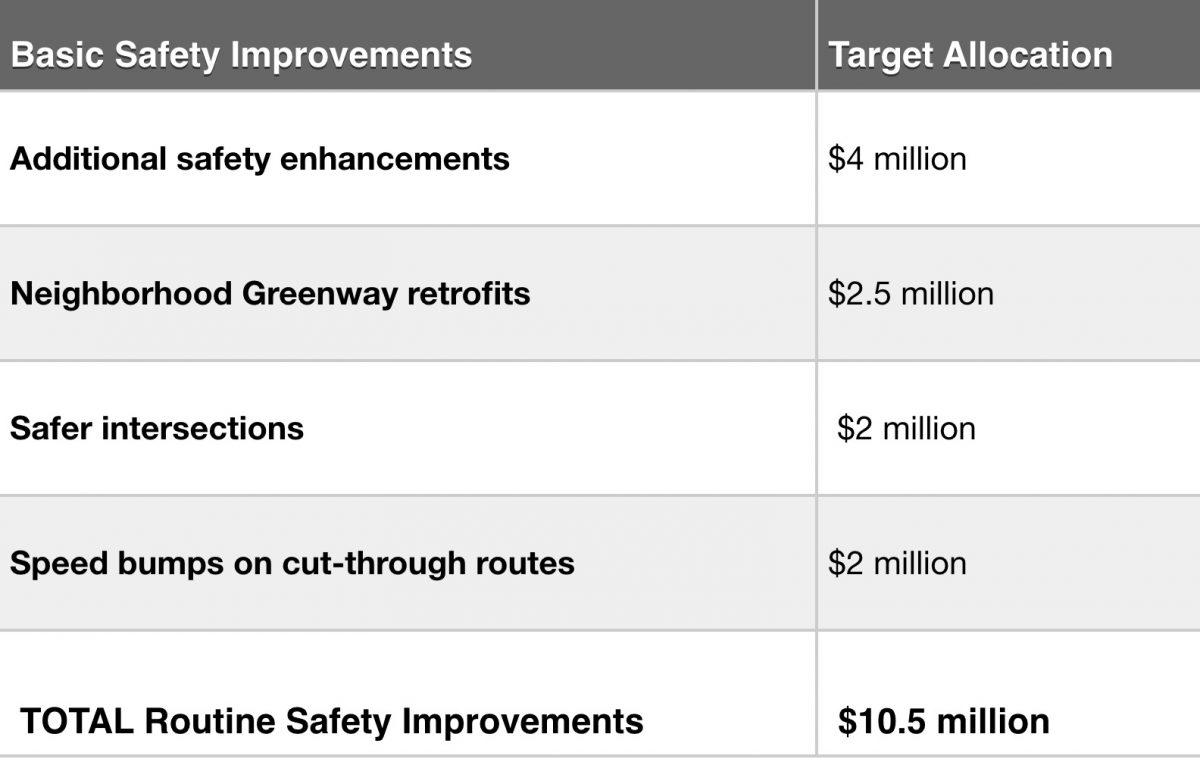
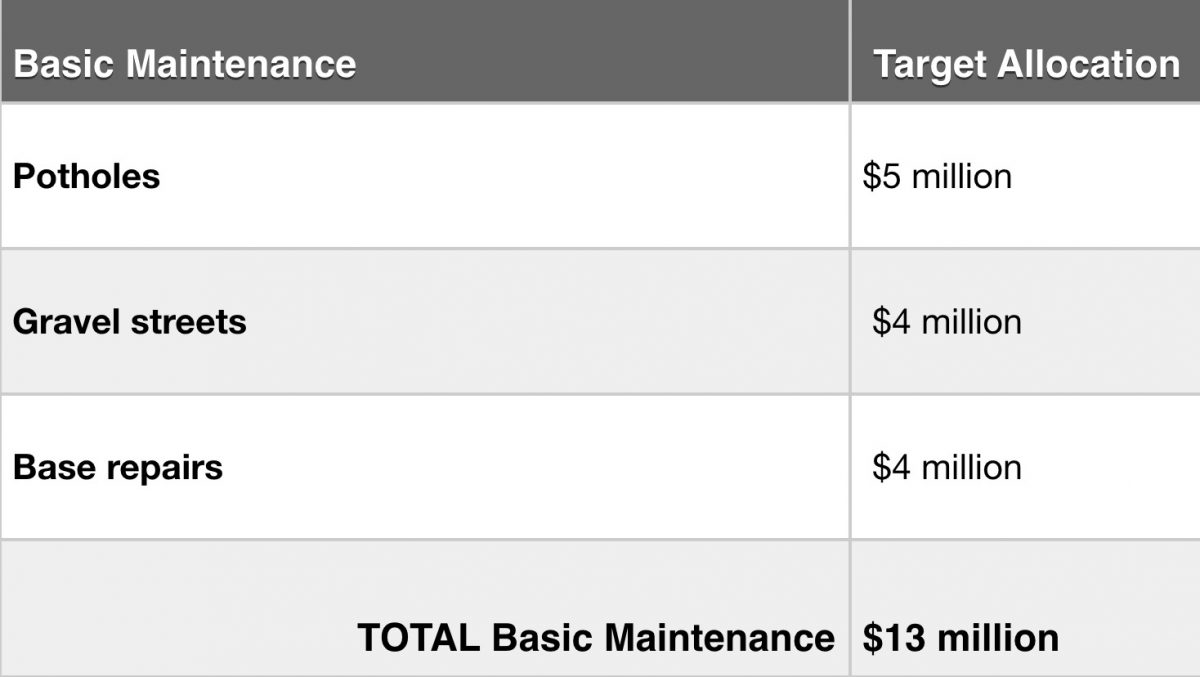
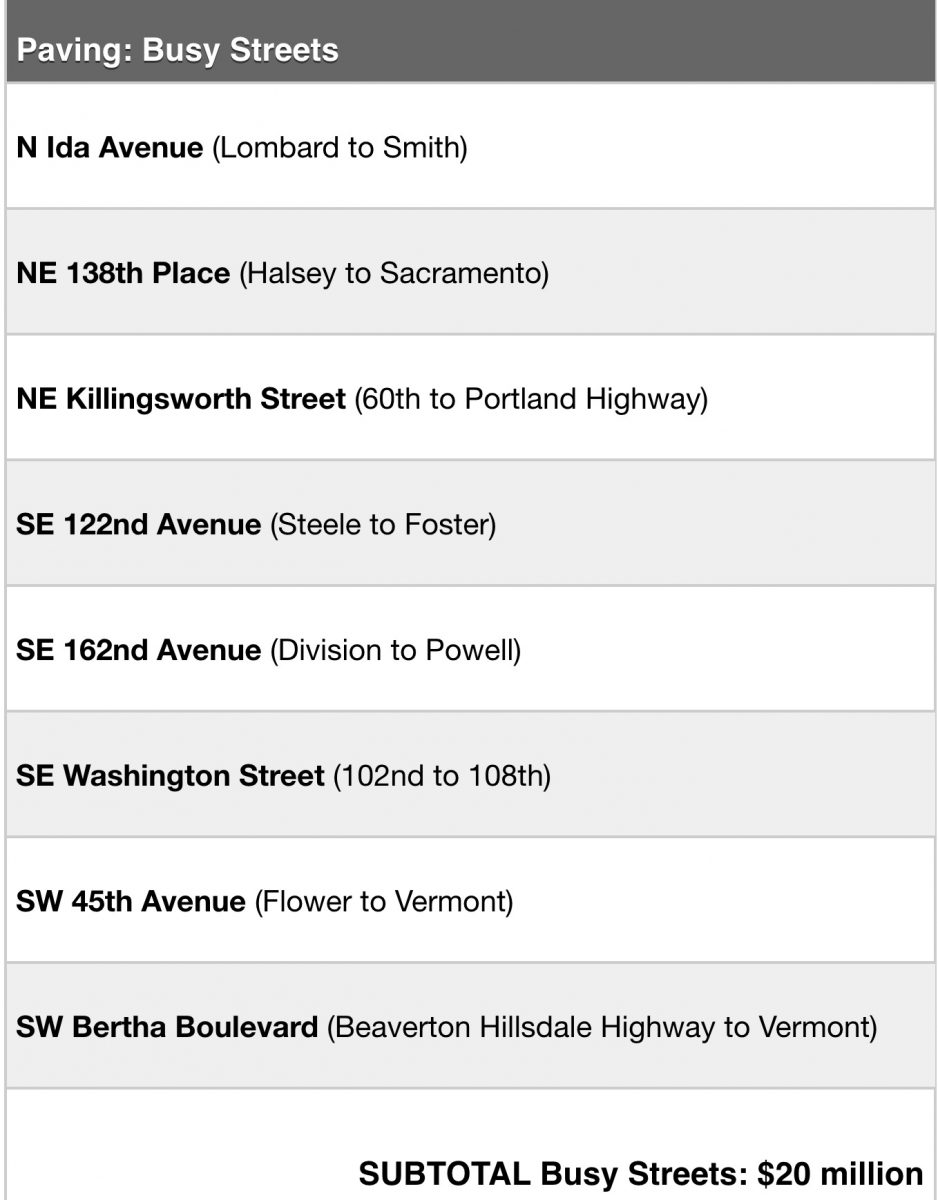
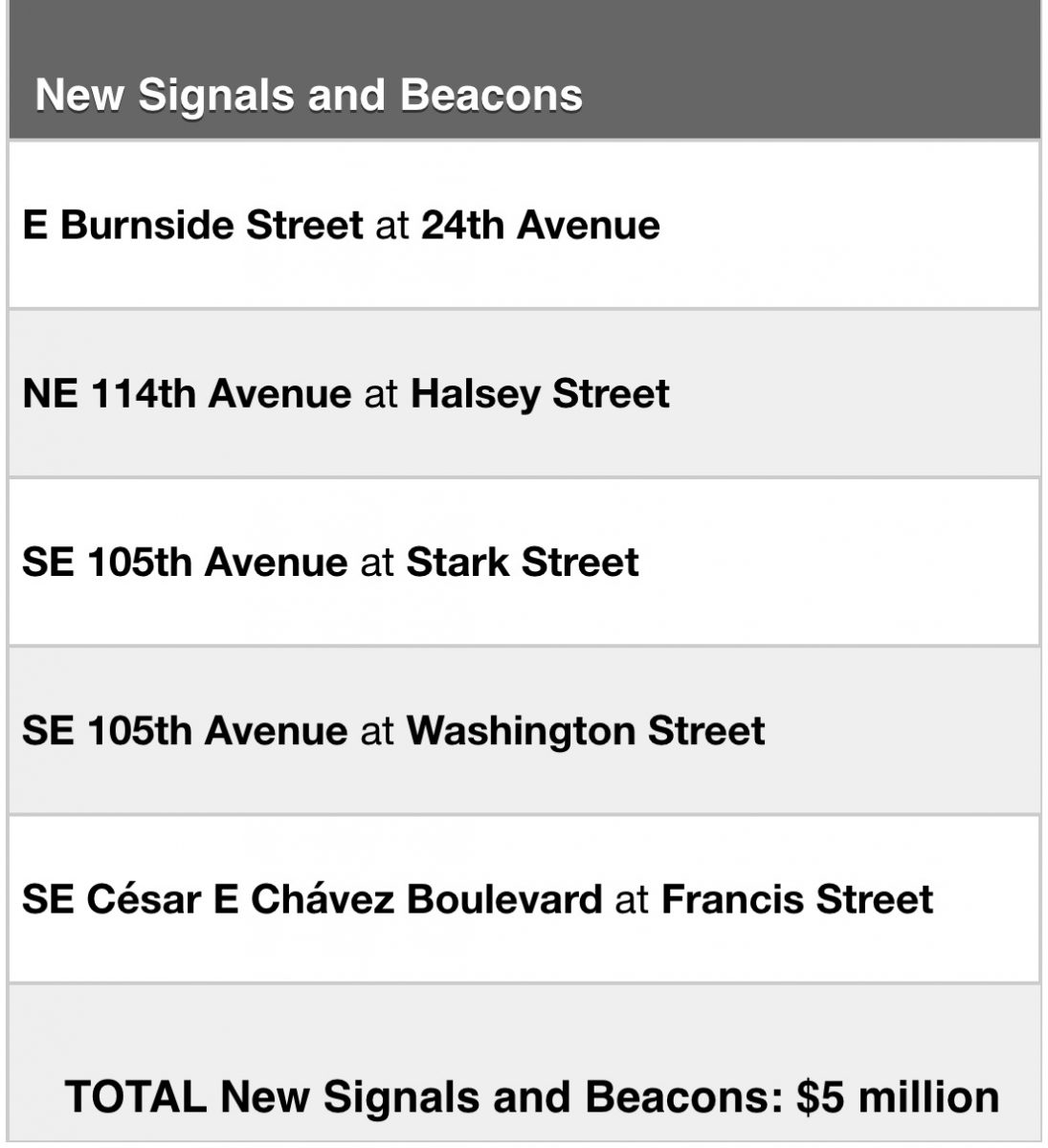
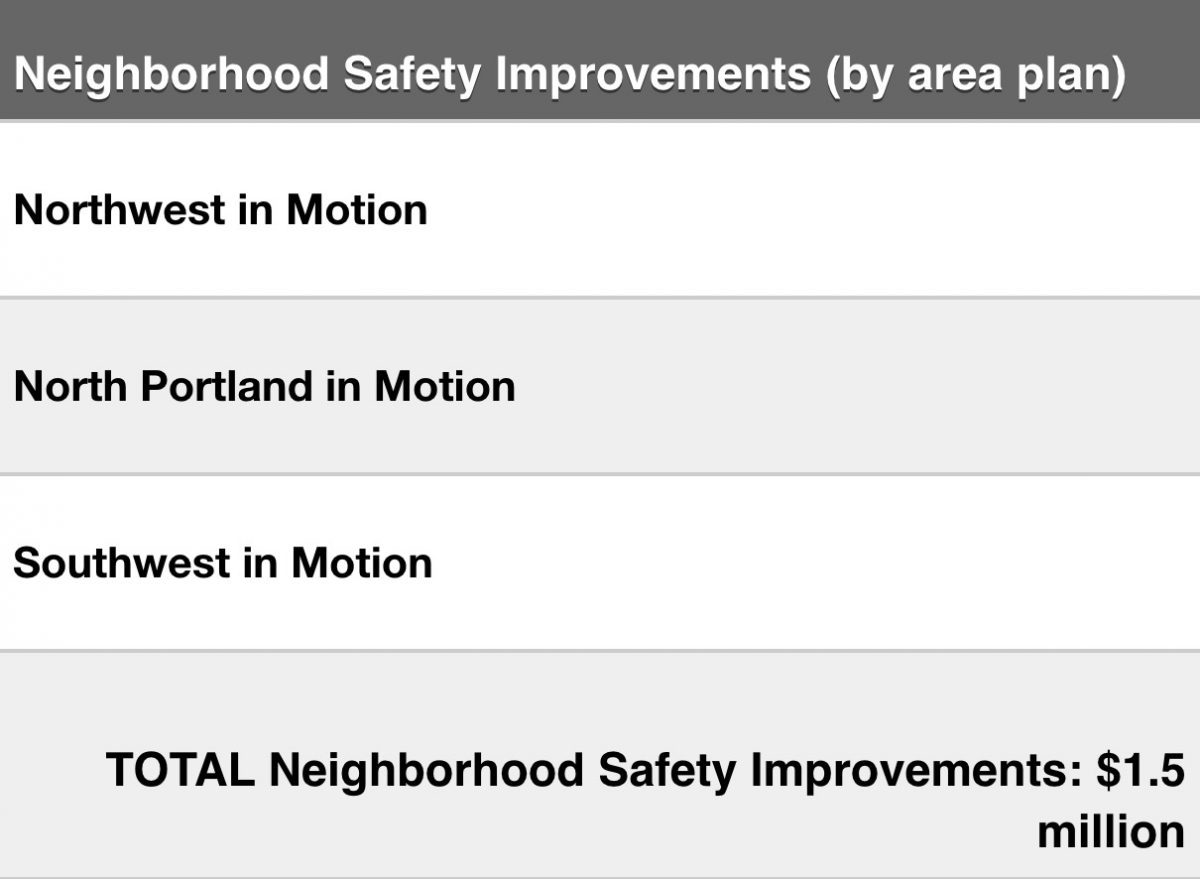
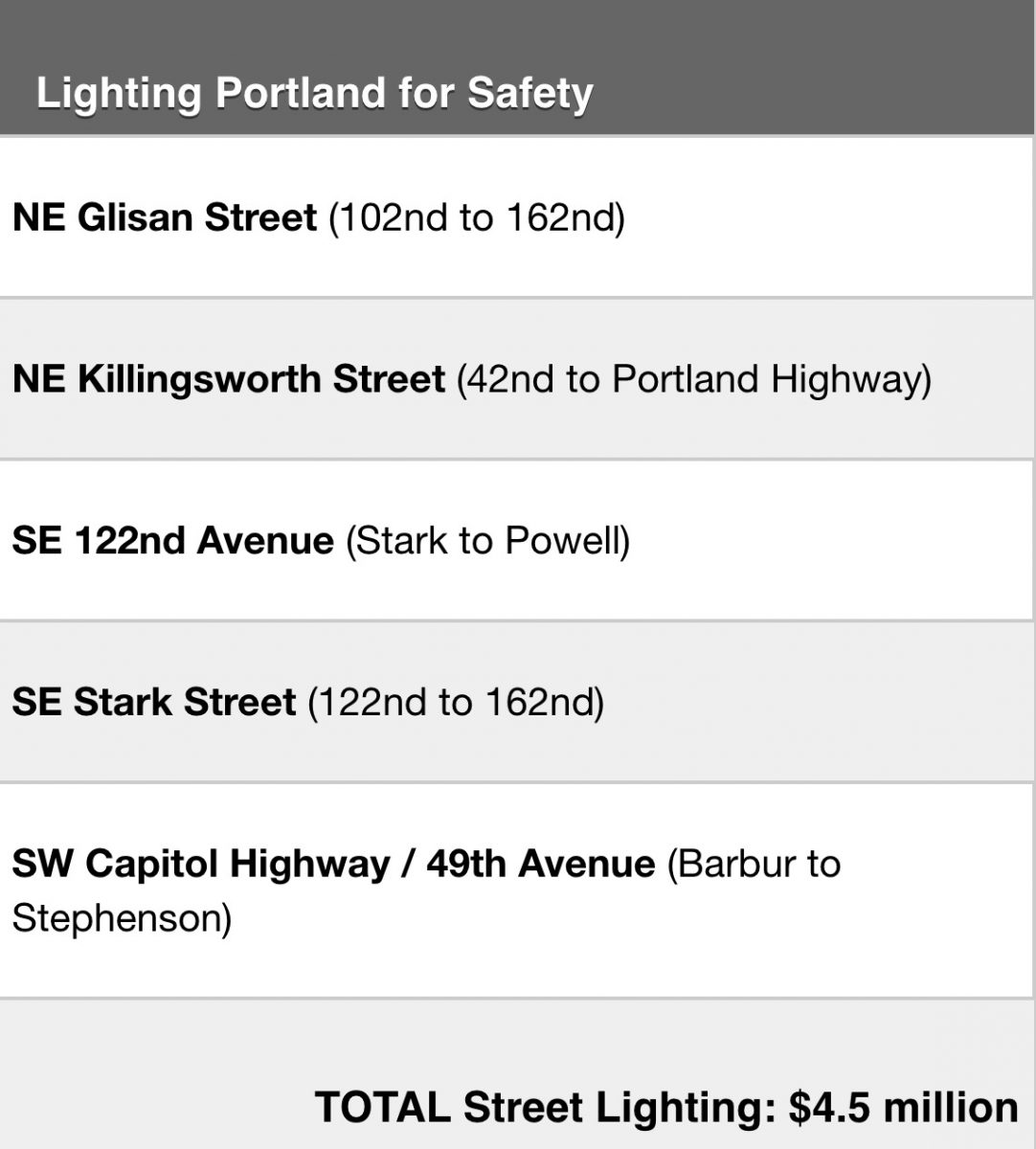
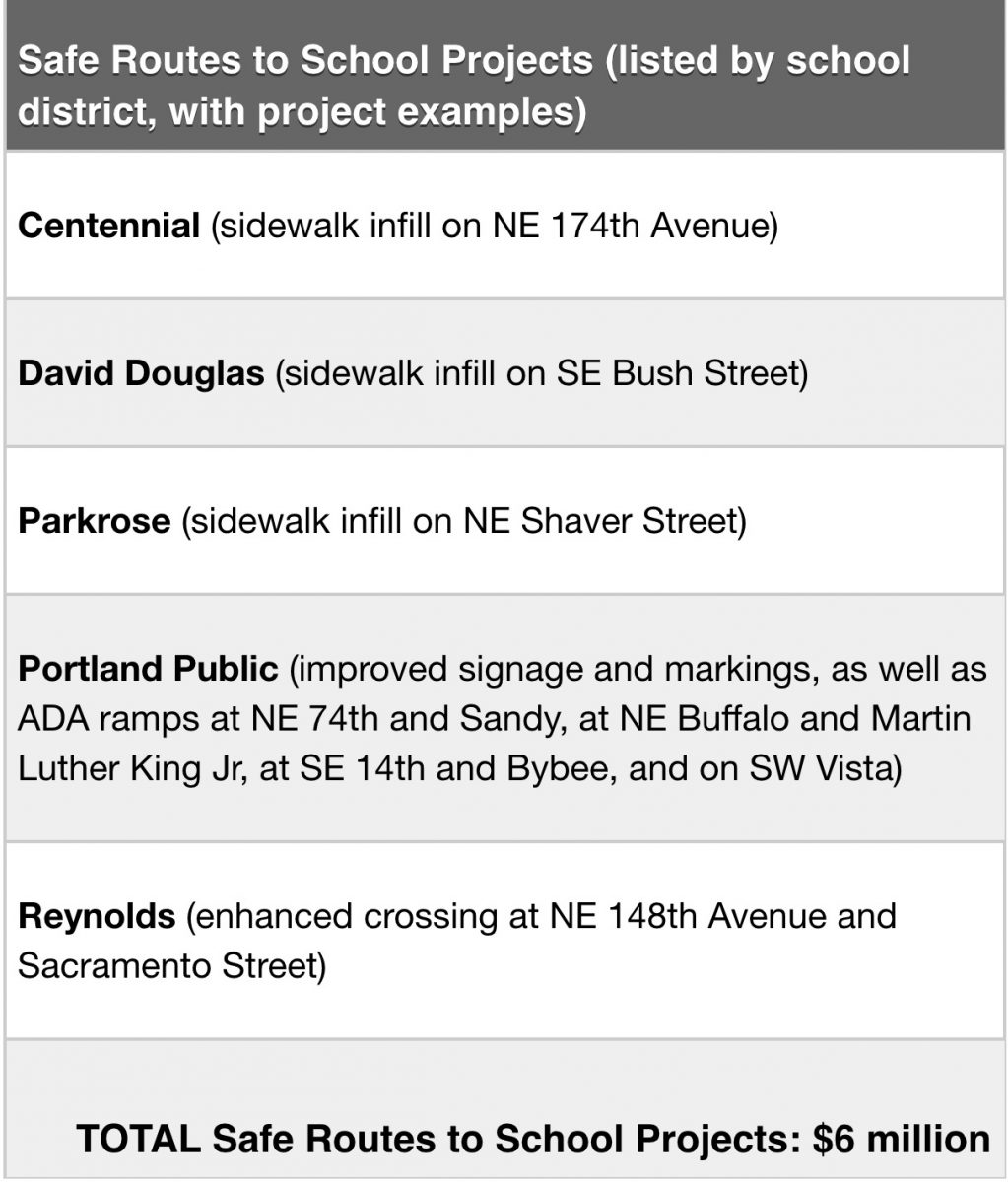
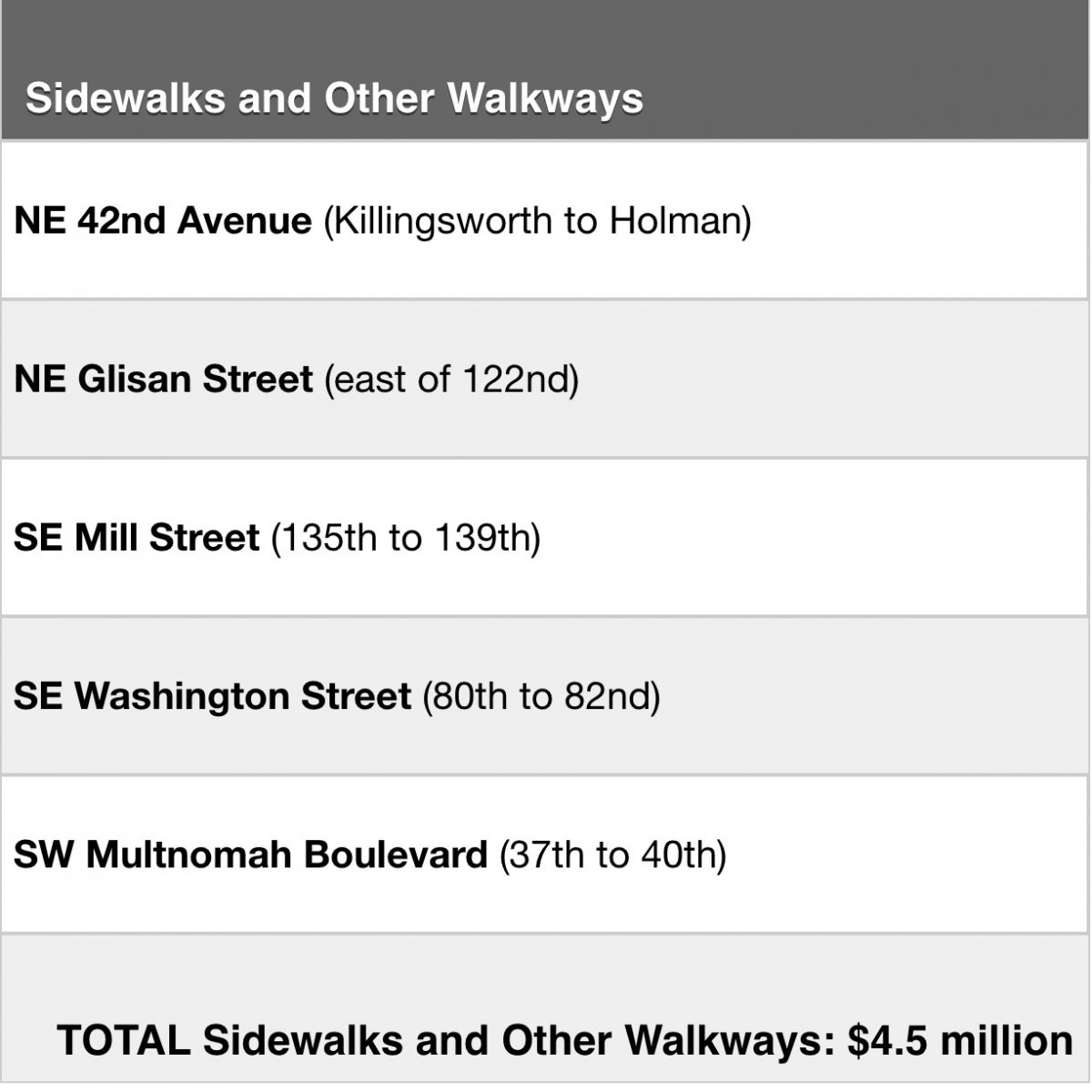
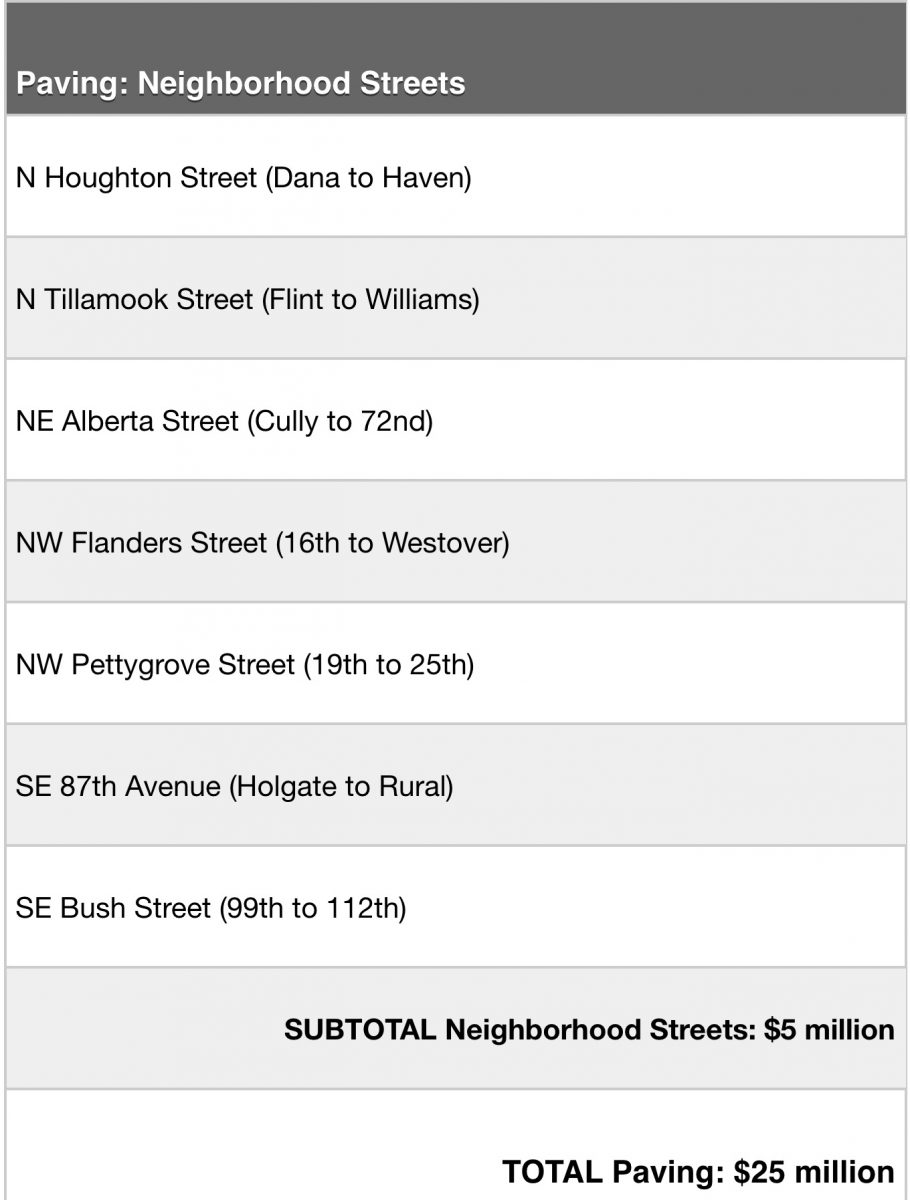
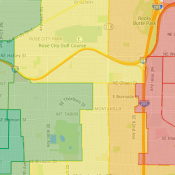
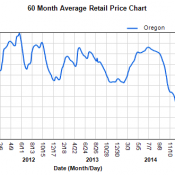
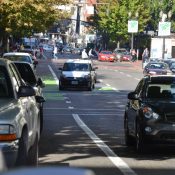
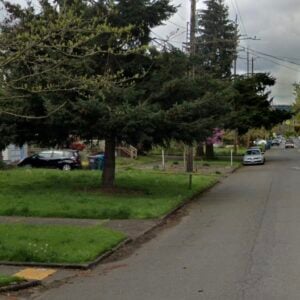
Thanks for reading.
BikePortland has served this community with independent community journalism since 2005. We rely on subscriptions from readers like you to survive. Your financial support is vital in keeping this valuable resource alive and well.
Please subscribe today to strengthen and expand our work.
With the mention of gravel, the first thing that came to my mind was to use fund to pave a bike lane wide strip on any gravel streets that force bikeways to detour (e.g. SE Woodward and 75th)
Small bore.
How about thinking big, using the bully pulpit to articulate a post asphalt, post oil vision? History will not look kindly on these timid efforts.
If one only strives for the fruit at the top of the tree, you’ll miss all of the other opportunities on the way up.
There is nothing wrong with small enhancements. Many small enhancements can still add up to a large sum.
Your metaphor is familiar and on its face comforting, but it is not apt here. The proposals being discussed here are not ‘on the way up.’ We are on the way down, and the timid gestures we are seeing here offer a false sense of reassurance, along the lines of your statement above.
As with so much that passes for policy today, the strategies on offer: pot hole patching, new crossings, maintenance have exactly nothing to do with—-do not advance us any closer to—-solving the pressing issues of our time.
Climate change, the end of cheap oil, billions in fossil fuels subsidies, Car Head, and the other well known challenges we face require a vision, a starkly divergent approach from what we have seen, from what we continue to be offered. No amount of incrementalism which you (and PBOT) are championing is going to cut it. You are about forty years too late.
I don’t trust PBOT enough to want to give them any of the pennies of this tax that I would have to give them.
I supported this measure in 2016, and I’ll support it again, but judging from the election results last time round, it’s hard not to conclude that this measure was “in-the-bubble” Portland imposing its will on the rest of the city.
With proper geographic representation, this probably would not have even made it on the ballot.
https://bikeportland.org/2016/06/23/portlanders-divided-sharply-by-geography-on-the-local-gas-tax-186264
Is proper geographic representation like the national election where more land gets more votes? What’s proper about that?
Similar to the national presidential election, why would PBOT spend so much money in inner Portland when they know that voters there will support any tax for anything? (Similar to California, Oregon, Washington, NY, and New England who always vote for Democratic candidates; or Texas and the Great Plains states always vote Republican.)
Instead, PBOT should push for projects in the swing-precincts of Portland, areas of poverty and strong ethnic diversity, who could vote either way. (This is why after nominations are completed, the major candidates only campaign in biggish swing states like the Carolinas, Virginia, Georgia, Florida, Penn, Ohio, & Michigan – why campaign anywhere else if you already know the result?)
Why do you suppose a voter in E Portland (red) is more (or less) likely to change their mind than one in Creston-Kennilworth (yellow) or inner Portland (green)? [referring to the colors on the map I linked to earlier]
Strategically, you could equally argue that PBOT should spend in ways that maintain support in gas-tax strongholds while ignoring those areas that are unlikely to support the tax no matter what PBOT does. Embrace the tyranny of the majority.
IMO, on the 2016 voting map, the inner green areas will vote for the tax no matter what, so rightly PBOT has fewer projects there. In the outer red commie areas, pBOT already has a lot of projects scheduled for that area, but because of the diversity there, they need a few more. It’s the middle yellow areas where they need the most projects, and they have rightly called out all the gravel regrading for numerous streets in those areas.
The other thing to keep in mind is that a transportation project is linear, that it helps a person to pass from inner Portland to jobs in Gresham, Swan Island, the Columbia Corridor, and the reverse directions too, so projects in the middle are rightly prioritized by PBOT.
This new proposal has a large cut in the proportion of spending on traffic safety over the last Fixing our Streets proposal. It’s essentially a regressive tax that funds fossil-fuel-centric automobility. Given that PBS data shows that Portland’s GHG emissions have markedly increased since 2015, this business as usual proposal is hard no for me.
PS: It’s infuriating and inappropriate that the city has intentionally delayed release of the 2019 climate action plan update that showed increased GHG emissions.
Because they’d have to admit that it’s a lost cause?
That’s the spirit!
Sometimes one has to be pragmatic. Like a triage doctor.
If it is a lost cause, why are you here?
It is *NOT* a lost cause!
So many people *could* choose less impactful ways of getting around, if they wanted to, and if the right incentives were in place. I’m an old guy and I once cycled to a meeting downtown, with a bunch of 20-something attendees. One of them said, “No one is going to bike anywhere.” Yet I had – to that very meeting! And it took me only marginally more time than driving (20 minutes to cycle, 15 to drive, probably). That’s the prevailing attitude that needs to change.
Think about it: In the USA we’ve spent over 100 years building infrastructure for cars and other motor vehicles. We’ve hardly scratched the surface of what’s possible for other modes, yet here you are, saying it’s a lost cause.
As a resident of NW Portland, poor lighting is an issue at many crosswalks and corners.
As a deep outer SE resident, I invite you to walk around out here with barely there and straight up missing sidewalks and far worse lighting than anything you’re contending with in NW. Honestly not trying to knock your concerns but after many many years of living close in and then moving out this way, holy wow, I don’t want to say close in residents can’t complain about infrastructure, but I kinda want to say that you can’t complain about your infrastructure.
When I’m out after dark I sometimes dig it. It’s like my youth in the much-more-rural-at-the-time NE Vancouver. But I also think, hey I pay higher property taxes than friends that live way closer in than I do, I fill up my trucks gas tank from time to time too, I want fucking sidewalks so I’m not walking in the street or muddy paths on the side of the road, and it would be cool to see where I’m going at the same time.
It’s not just outer SE. Many parts of otherwise “wealthy” SW Portland have no sidewalks, no lighting, etc.
You’re totally right. I suspect topography comes into play over that way. I go on longish runs that take me south of the Springwater, and it’s hilly (and probably out of Portland proper) and there are very few sidewalks and the lighting is sparse. Where I am the city can’t blame topography for making sidewalks a tough thing to put in.
My neighbors who don’t like the Gateway changes but want some safety improvements just not the lane reductions keep bringing up paving, lighting, and sidewalks. PBOT seems to be trying to give those to them I wonder if they’ll vote against this just out of spite. I think mostly they don’t care one way or the other but there’s some vocal ones that really dislike the changes and a handful that are supportive of them. I have a feeling the vote will go the same as it did last time. I’ll be voting for it though if anything just because we keep asking PBOT to do all these projects like pave and improve safety but then we don’t fund them properly.
Voting NO. The vindictive lane removal in the Gateway / 102nd area has been a disaster. Seeing traffic backups like never before, visually cluttered confusing streets, and lots of cut-through traffic in our neighborhood. And guess what? Barely any use of the newly created bike lanes. But our high council knows what’s best.
How can a road diet be vindictive? I live out in this area as well, commute by car and bike to NE Colombia. I don’t mind it other than the fact that there isn’t a single bus line that runs up that direction.
It’s called progress. The future isn’t single occupancy vehicles and everybody knows it.
Oh hi neighbor. Same old talking points again huh? I’m not sure it’ll do much good but I’ll point out that the bike lanes are more about slowing people down then getting people to ride more. I’ll also point out that behavior doesn’t change over night and people don’t just suddenly start driving slower or hop on a bike the next day when roads are changed. Sorry about the cut-through traffic but I do find it interesting that you’re upset with the City for other people selfishly driving down your street too quickly so they can save a few seconds on their commute. Do you also blame the city when someone cuts you off or does any other selfish dumb thing in their car around you?
Finally the “high council” oh you mean the council members that voted to improve the safety of our streets who then asked engineers what the best practices currently are for slowing people down and making them pay more attention? How should we decide to design our streets to improve safety? Just let unqualified people who have a personal interest in saving a few seconds on their commute through streets they don’t live on vote on designs or something? Is that a good way to engineer a street? I’ve been asking to see all the complainers alternative designs that allow people to get through as quickly but still have the same safety benefits and yet to see a single idea from any of you. Or are you one of the ones that scoff and just say these won’t help despite evidence to the contrary?
= comment of the week.
Many good points here, but I think we have a really problematic situation on our hands. Many drivers remember how they used to be able to drive quickly – and unsafely – and they want to return to their old, unsafe driving behaviors. The cyclists and pedestrians and people outside cars love the new streets – they feel safe and they *are* in fact safer. But if you never step outside of a car, you don’t experience the improvements – you experience just the downside of sitting in traffic for a few more minutes or seconds.
I try to remain hopeful, but I think *nothing* will get people out of their cars short of $20/gallon gas or some other catastrophe.
“the bike lanes are more about slowing people down then getting people to ride more.”
Then why build bike lanes? Surely there are other more effective ways to do this.
Then what are they? Are you an engineer? What are the best practices? Engineers can’t just do things for no reason they are liable for poor designs if they can’t provide evidence that the design choices they made were done based on the best practices in the industry. Everyone keeps saying there must be a better way to do it but provide no other solutions.
Also I said more about slowing people down then getting people to bike. I didn’t say that was their only purpose. They also have the bonus benefit of providing more bike infrastructure for people to choose to use if they want so that they have an option other then driving.
Painted bike lanes are in fact designed to keep cars in their respective lane rather than try to pass other cars on the inside lane – they use up leftover street width and reduce very expensive end-of-curb maintenance costs. In that respect they do in fact slow cars down, as passing is much more difficult and very illegal. Sometimes cities will paint in a parking lane instead, a bit wider than a bike lane with narrower white lines, but they serve the same purpose. Their use as a lane for bicycle riders was always an afterthought – I have yet to meet a traffic engineer who thinks that a painted bike lane (or parking lane) is a safe environment for anyone to ride a bicycle. The engineers themselves would never use one nor take their kids on one.
The purpose of a buffered bike lane is to restrict car traffic to an even narrower track, to reduce long-term roadway maintenance costs, and to discourage pass-through car and truck traffic. That they are a “safer” environment for bicyclists is coincidental and has never really been proven. Again, traffic engineers are still nervous about using the buffered bike lanes themselves and/or with their kids.
I didn’t say the bike lanes were safer for cyclists. I said they were to improve safety and slow people down. Which it seems like what you’re saying agrees with that but you couch it in all this engineers wouldn’t take their kids in that lane nonsense. What’s the purpose of that? What are you trying to point out or achieve?
Because it is ultimately the decision(s) of traffic engineers of what lines get put in the streets or not, and why they are or are not put in. If your local traffic engineers feel that bicycling isn’t anything other than a recreational pursuit, then they’ll never make any improvements that they or any other interested but concerned rider would ever willingly use.
Oh lord – a gas tax being used for roadway improvements!
Yo chill out man. You work for PBOT or something?
I’m starting to think people like this are a lost cause. No amount of data, reports, or logic seems to make a difference. I could split reality in two and show them a world without these changes and one with where the one without people are dying in greater numbers and they would just respond with “Yo chill out man. You work for PBOT or something?” or “Well I just think there must be a better design.” The problem seems to be that they didn’t reason themselves into their opinion so they can’t be reasoned out of them.
You’re awfully combative with people here. Are we not entitled to have opinions? You seem really bothered if those opinions differ from yours. So sorry we don’t all hold PBOT in such high regard.
Maybe if they lost some funding then they could learn how to actually serve the community instead of tossing a deaf ear and pissing people off?
I was out in Multnomah not long ago, my home turf. Drove up our old street…SW Hume St. between 35th and 37th. Lots of new and remodeled houses and the cute little old place that held all six of us, but the street is as potholed as ever! No speeding cars here, easy to walk right down the middle, even ride a bike…I learned on our street pot holes and all. An easy walk to the “Village” via a very unpaved 36th; hardly a sidewalk to be found anywhere. All in all pretty nice…a little country town. Not much talk of LIDs…let someone else pay. But I’ll vote YES…taxes are generally the best money we spend! Streets, parks, libraries and more.
Not if they are poorly administered.
Another regressive tax that falls hardest on Portland’s working class who are under-served by TriMet and PBOT, hard pass. I don’t see why my neighbors should pay extra to fund projects in neighborhoods where the houses run $800k. Let them set up local taxing districts. It’s not like we can safely access those streets from my neighborhood anyway.
It looks like they threw in some token/low-value projects in St. Johns. Why in the hell is Ida getting repaved? Why are we still wasting tax payer on speed bumps that we all, including PBOT, know don’t discourage cut through drivers. Why is Delware getting a greenway “treatment” when its blocks from Concord. Is there anyone who works at PBOT who actually lives outside the city center?
I spoke with Sheila Parrott, PBOT Project Manager, and was informed that she lives in downtown. She oversees many projects that she will never use. When asked about the numbers about her “pilot project” and she tossed around some gibberish about “well, I’ve heard it’s been 50/50.” I’m not sure what planet she lives on but it seems like a clueless one.
The two of you and all your anger and hate baffle me. Well I guess they don’t really but you seem to care about these things but are so locked in this opinion that everything that comes out of the City is terrible that you seem incapable of having a rational opinion about anything they’re doing. Are you just lost causes incapable of reason? I don’t get it cause you seem to want things to get better but complain about everything while having 0 real ideas about how to make anything better. Please instead of spending your time whining about all this propose alternative ideas you think will work better, work to get data to support those ideas, advocate for people who have better ideas and explain why but please stop whining it’s exhausting.
“I don’t get it cause you seem to want things to get better but complain about everything while having 0 real ideas about how to make anything better.”
and how has your capitalism-tolerant liberalism worked out for transportation alternatives in pdx?
1. plummeting bike mode share.
2. multi-year declines in trimet ridership per capita.
perhaps boosterism of regressive politics is even worse than “whining about inequity”.
Surprise! – many streets with $800k houses also have no improvements, esp in SW Portland.
The emphasis on paving isn’t my favorite, but if the tax slightly reduces driving and emissions, that has value too.
The city auditor in 2019 reported that the money from the previous tax was improperly accounted for and did not fund projects it was intended.
To give them more money demonstrates a lack of honest thinking. Place responsible individuals in power first.
I just read the sudit report and it doesn’t say that at all. It concluded: The projects executed so far (many were) were the ones promised and were done on budget, that some projects were delayed because the projected schedules weren’t achieveable, that the heavy vehicle tax wasn’t taking in what was expected, and that the oversight mechanisms weren’t strong enough (oversight committee funciton, no required audits).
That’s actually a pretty strong report card. Items 2-4 on my list would be great, but they’re not the crucial outcome, which is that the promised projects–delays notwithstanding–are getting done and done on budget.
“Bureau staff said the schedules were not realistic, and that it took longer than anticipated to break ground because the scopes of individual projects were not yet well defined,” auditors wrote in the 26-page report. “Bureau staff said they did not flesh out full project designs before sharing projects with voters in case the tax did not pass.”
Auditors also said it was difficult to determine if the city was holding fast to its pledge to spend 56 percent of gas tax revenue on street repairs and 44 percent on safety. The watchdog city agency said Portland had made it “difficult to assess” whether that is true.
You must have missed that part.
I’m gonna register so I can vote against it. I’m tired of the gas tax only being used for inner downtown repaveing,downsizing vehicle thoroughfares and creating bike Lanes(bikes don’t use gas, therefore bikers don’t pay for bike Lanes). People pay a gas tax to keep the streets in good condition for vehicles that use gas to be driven on them. Now if there was a bike tax that paid for bike Lanes I’d say go for it… But there isn’t and I’m not.
So since there is a bike tax and cyclists pay taxes that go to road paving and other improvements that benefit drivers you’ll vote for this? I also don’t see any downsizing of streets in their project lists but I do see paving outer Portland streets and adding lighting and sidewalks. So since those are the projects you want gas taxes to be spent on you’ll change your vote to yes?
“(bikes don’t use gas, therefore bikers don’t pay for bike Lanes)”
You funny.
Check out VTPI’s famous report, Whose Roads? (Link below). Their conclusion, based on how transportation infrastructure actually gets funded in this country: those who bike exclusively overpay, should be cut a sizable refund check every year. (if we’re going to be picky as you are and make claims about who is paying and what is a fair share…)
https://www.vtpi.org/whoserd.pdf
Please get back to us after you’ve had a chance to brush up on these insights.
Thanks.
Oh, and one more thing. Bike lanes are derivative. They only have meaning because of the overwhelming and dangerous presence of the ubiquitous auto. Bike lanes in the absence of the auto would serve no purpose. Insisting that those who bike should pay for those lanes is akin to insisting that battered women pay for shelters.
The article said they used the money to improve East Portland. The only thing I’ve noticed is an uptick in homelessness and crime.
Will vote YES! I think $.10 is a little low tho; $.50+ would be more appropriate. And where are the I-5/205 tolls?!
I did enjoy your word salad of generalizations of my participation level. But for the record, I have plenty of emails praising the city as well and it just so happens that I am involved in my local community as it pertains to transportation. But you should also be aware that I won’t drink the Vision Zero koolaid because it sounds nice and works in Copenhagen. Because we all know what really actually works and it isn’t just infrastructure changes but also a “little” enforcement. The problem with this pipe dream that we are living in is that we don’t really have any. I can’t get the sorry excuse for a speed camera van to move 5 blocks without doing something that the city can’t explain for me to do in order to calm down the crazy motorists who frequent my street due to the Foster redesign. So, I get your data aspect, which is what I said Sheila was lacking, but common sense also works but clearly not downtown. Telling me to “get the data” is perhaps funny because I actually have to be a dad, husband, work. I use my free time to get out of this mess. Please don’t toss around data bs when the numbers of people dying on our streets isn’t declining because that only makes you the one with the data hat but looking silly. I “hope” I was able to prove to you that my comments are valid, lol